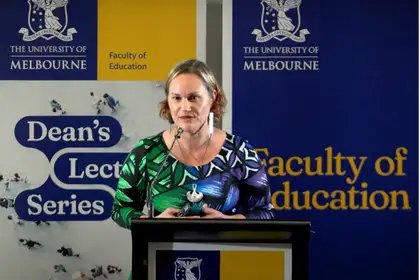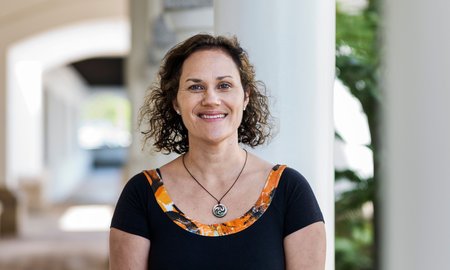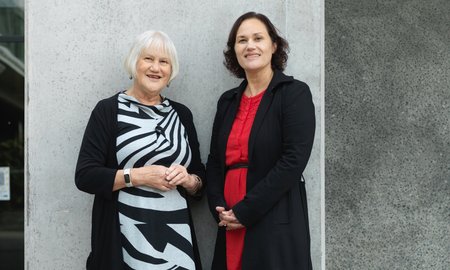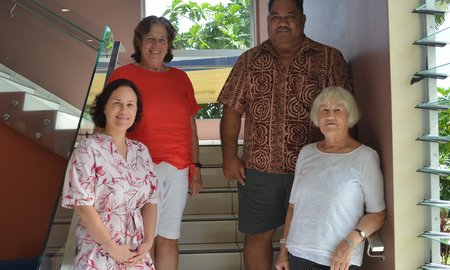
Her talk, Gap-gazing or recognising strengths: rethinking mathematics education, emphasised the transformative potential of incorporating cultural strengths into teaching practices.
Inspired by Professor David Clarke’s pioneering work on visual methods in education, Professor Hunter highlighted how these approaches can reveal the often-overlooked perspectives of students.
“Visual methods allowed us to gather the voices of those we often do not hear from and understand the worlds of the children we work with,” she explains.
Professor Hunter’s talk addressed the issue of under-representation in mathematics, particularly among Pacific students, sharing a recent monitoring study in Aotearoa New Zealand where only 11 per cent of Pacific students were meeting the appropriate curriculum level at Year 8. She also shared how this flows into seeing low enrolments in tertiary education and a low uptake of science subjects, with the trend reflecting a broader failure of the education system to support diverse learners.
“Often, the narrative of failure is framed as a deficit within students, their communities or cultures, and I’m now hearing that from the children themselves who believe they can’t do maths because of their culture. The research we are doing aims to shift that perspective and recognise how strengths within communities and cultures can be used to rethink what mathematics education can be.”
Drawing from her Cook Islands heritage, Professor Hunter’s work explores the different knowledge systems children might be entering school with and builds upon the frameworks of funds of knowledge and indigenous knowledge systems. By acknowledging how all cultures possess valuable knowledge and skills that are not always recognised by the education system, these diverse knowledge systems can be incorporated into the curriculum to create more inclusive and effective learning environments.
Professor Hunter shared an example of this approach from a 2018 research project in Niue, where students used photography to document and share their everyday experiences. It highlighted how students’ cultural contexts can reveal rich mathematical understanding embedded in their daily lives.
“Children captured instances where they saw mathematics in their daily lives, and their stories unveiled a deep connection between their culture and mathematical concepts,” Professor Hunter explains.
The project also revealed a broader perspective on mathematics, not only for students but parents and educators, showing it as an integral part of everyday life and cultural identity.
“There were many interviews which touched upon the fact that maths is real and incorporated in everyday living, not just at school, and that mathematics is a part of Pacific culture. One particular quote that stuck out was ‘our ancestors were mathematicians, we navigated over that vast Pacific Ocean in a very purposeful way to different nations’. It becomes more meaningful when we see how we engage with maths every day and that it is part of our culture and our identity, to think about how we have a strong history of mathematics and take pride in that.”
The research illustrates that integrating cultural contexts into mathematics education can transform students’ perspectives and their achievements.
“It gives children access. When children engage with patterns from their own cultural backgrounds, they can better understand and generalise mathematical concepts. This approach not only enhances their learning but also fosters community strength and self-advocacy,” Professor Hunter explains.
Through this research, Professor Hunter promotes localised and place-based forms of curriculum innovation and reviewing current resource material and text-book schemes to ensure they reflect diverse mathematical experiences and prevent stereotypes.
Through visual methods, cultural integration and a focus on the strengths of knowledge systems founded in children’s communities, Professor Hunter believes the mathematics education system can be challenged to grow into a more inclusive and empowering field for all learners.
Watch Professor Hunter’s presentation here.
Related news
Making mathematics more accessible in the classroom
Professor Jodie Hunter is on a roll in her mission to make mathematics more accessible to children in the classroom.

Helping school children overcome mathematics anxiety
Helping students to better connect with their maths lessons is at the heart of work currently being undertaken at the Massey Centre for Research in Mathematics Education.

How two Massey academics are helping to teach maths in the Cook Islands
The way that school children in the Cook Islands are being taught maths is undergoing a shake up, thanks to a group of academics from New Zealand, the United States and Australia.
